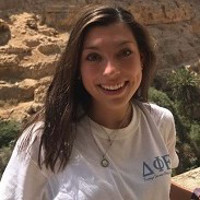
International Affairs
Written by Grant Johnson, ('24)
From the Levant to Oxford, England: Honors College senior Kendra La Fave bookended her college experience with two study abroad trips, both connected by a recent publication in an academic journal.
La Fave, an international affairs major and humanitarian affairs minor, wrote a blog for the Oxford Middle East Review that was published Jan. 5. It combines her summer 2019 trip to Israel and Palestine with her fall 2021 semester in Oxford.
Her one-month excursion to Israel and Palestine, conducted through the JMU’s Political Science Department, occurred between her freshman and sophomore years. La Fave said she was the youngest of the six students on the trip. While she was originally attracted to the region for its rich blend of language and culture, La Fave quickly delved into the geopolitical landscape, studying humanitarian issues and peace efforts related to the Israeli-Palestinian conflict.
Her semester in Oxford — Sept. 10 to Dec. 10 — crystallized the concepts she learned two and a half years ago in Israel and Palestine. Oxford’s characteristic tutorial system allowed La Fave to work on the blog “without even knowing it,” as her weekly readings and 2,000-word essays prompted reflection between her current coursework and previous trip to the Levant.
She said she discussed these reflections during her weekly, one-on-one meetings with her tutor, who encouraged her to write a blog post for the Oxford Middle Eastern Review. La Fave said her Oxford tutor’s encouragement helped build the confidence to publish for the first time. Throughout the writing process, La Fave routinely revisited her 2019 trip through photos, which she said brought back imagery that had “sat and marinated” for nearly three years.
“One-on-one discussion with my tutor about it really reinvigorated my passion for the research,” La Fave said. “Oxford was really helpful [at] lighting that fire again.”
Resulting was a blog post focused on symbols of Palestinian oppression: nets and glass in Hebron, a key from a refugee camp in the West Bank and a handcrafted keychain she purchased after meeting with the Union of Palestinian Women’s Committees.
“I didn't even realize I kept getting attracted to the language of symbols and stuff until I put all of those pieces together,” La Fave said. “I had unknowingly done it every time.”
While La Fave said she’s still unsure of what post-graduation holds, the two trips taught her that doing work with her “boots on the ground” adds meaning to classroom work, and that she wants to use her critical thinking skills in both research and the field.
“It felt very personal,” La Fave said about her time in Palestine. “As someone who studies these very massive, theoretical concepts about military checkpoints, refugee crises and grass-root advocacy, it put a very real-life experience to these concepts I had just read in books before … [It] propelled me to want to learn more about the topic.”
She said the Israeli-Palestinian conflict is a complex issue spanning many dimensions and generations. Yet, there is optimism for the future of Palestinians.
“You can log on to Facebook, Instagram, Twitter, whatever, and you can get real-life pictures of what's happening, and so for me, that does provide hope,” La Fave said. “There's people who want to return to their homes … and I think that that's still applicable as it was back in the ’40s to now.”
